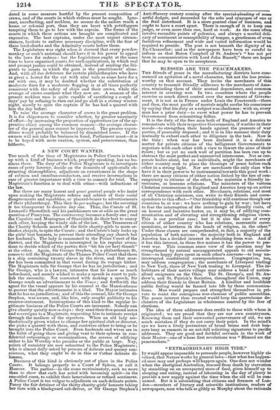BLESSED ARE THE PEACEMAKERS.
THE friends of peace in the manufacturing districts have com- menced an agitation of a novel character, but not the less praise- worthy on that account. They invite the merchants of this country to transmit friendly addresses to the merchants of Ame- rica, reminding them of their mutual dependence, and common interest in averting war. In two countries where the people exercise so much direct control over the movements of Govern- ment, it is not as in France under Louis the Fourteenth—there and then, the most pacific of mortals might soothe his conscience by saying that his duty as a subject was obedience : with us, every man has a prior duty—to exert what power he has to prevent Government from committing follies. It is the duty of the free men both of England and America to remonstrate with their respective Governments, if warlike in their moods—to strengthen their hands against the pressure of war parties, if peaceably disposed ; and it is in like manner their duty mutually to exhort each other to diligence in the task. Now m the time : when war has been declared it is a delicate matter for private citizens of the belligerent Governments to negotiate with each other with a view to thwart the aims of their rulers ; but as yet no such wall of partition has been run up to obstruct the most perfect and unreserved intercourse. Not as cor- porate bodies alone, but as individuals, might the merchants of either country seek to place the blessings of peace before each other in a strong light. Nor are merchants the only class who have it in their power to be instrumental towards this good work : there are many citizens of either nation linked by the ties of con- sanguinity to citizens of the other, who maintain a friendly in- tercourse, as beseems relations. The ministers of the various Christian communions in England and America keep up an active correspondence with each other. Merchants, relations, and most of all Christian ministers, can write to their friends and corre- spondents to this effect—"Our friendship will continue though our countries be at war : we have nothing to gain by war ; but have to fear the interruption of the interchange of friendly visits, of an honest and lucrative barter, or it may be, of editing com- munication and of elevating and ;trengthening religious views. This is our peculiar case; but it is also the case of every citizen of either country who has relations, mercantile corre- spondents, or brethren in the bonds of religion, in the other." Under these classes are comprehended, in fact, a majority of the population of both nations : the majority both in England and America has a decided interest in abstaining from war. And if it has this interest, in these free nations it has the power to pre- vent war. This common sense view of the question may he strengthened by natural unexaggerated appeals to old associa- tions—to happy days spent in each other's converse—to long un- interrupted confidential correspondences. Congregation, too, may address congregation ; the merchants of Liverpool trading to New York, those of New York trading to Liverpool. The in- habitants of their native village may address a band of nation- alized emigrants on the Ohio. The St. George's, and St. An- drew's, and St. Patrick's Societies, throughout the Union, may address their friends in Great Britain. A kindlier and healthier public feeling would be fanned into life by these communica- tions. Men would prepare and strengthen themselves in pri- vate to resist the contagious war-clamour of public assemblies. The peace interest thus created would keep the quarrelsome de- claimers of the Legislature in wholesome control by the fear of elections.
The idea of these addresses does credit to those with whom it originated ; we are proud that they are our own countrymen,. Knowing them and their unwearied perseverance of old, we are much mistaken if they do not carry their point. In the mind's eye we have a lively portraiture of broad brims and drab bon- nets busy as emmets in an ant-hill soliciting signatures to pacific addresses. They are good and faithful servants in the work of their Master—one of whose first revelations was "Blessed are the peacemakers."


























 Previous page
Previous page